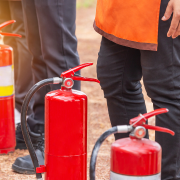
Industry Training Pathways
Discovering your path to a successful career in the energy industry has never been easier. Whether you're new to the sector, just starting out, or looking to expand your skills, Working Energy provides a user-friendly platform to help you find the right training. Our extensive resources and guidance empower individuals at every level to identify and access the training they need, ensuring you're well-prepared to excel in the dynamic world of energy. Let us be your compass on a path to a fulfilling career in the energy sector.
New to the Industry
Begin with the industry's foundational basic training
Updating You Career Credentials
Updating Your Career Credentials Intro Second

H2S Alive
H2S Alive, also known as Hydrogen Sulfide Alive, is a safety training course that equips workers with essential knowledge and skills for safely working in and around hydrogen sulfide (H2S) environments. H2S is a toxic, colorless gas commonly encountered in industries like oil and gas, mining, and refining. This one day course covers H2S properties, health effects, detection, personal protective equipment, emergency response procedures, and first aid. It ensures that workers can identify and mitigate H2S hazards, fostering a safer working environment.
Find an authorized training provider near you

Standard First Aid/CPR
First Aid and CPR (Cardiopulmonary Resuscitation) are essential life-saving skills that individuals can learn to provide immediate assistance to someone who is injured or experiencing a medical emergency.
Certification in these skills is typically valid for a specific period, and individuals may need to renew their certification periodically to stay up-to-date with current guidelines and techniques.

Wildlife Awareness
Wildlife awareness training is an educational program designed to provide individuals with the knowledge and skills needed to understand and coexist with wildlife in a responsible and sustainable manner. This type of training is particularly relevant in areas where human activities intersect with natural habitats, leading to potential conflicts between humans and wildlife. The goal is to raise awareness about wildlife, promote conservation efforts, and minimize negative interactions.
This training is relevant for a variety of audiences, including professionals working in fields that may impact wildlife habitats. The goal is to foster a greater understanding of the importance of wildlife and promote a harmonious coexistence between humans and the natural world.

Common Safety Orientation
A Common Safety Orientation (CSO) typically refers to a standardized safety training program or orientation that is designed to provide a foundational understanding of safety principles and practices. This type of orientation is often required for workers in various industries to ensure a consistent and basic level of safety knowledge across different job sites and workplaces.
